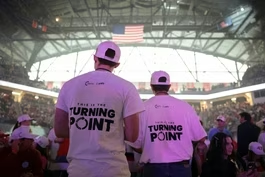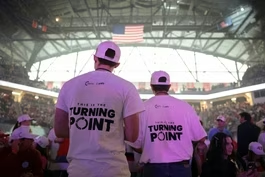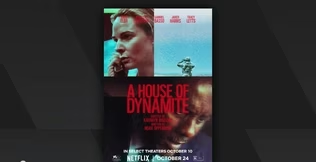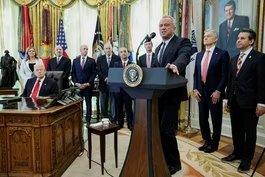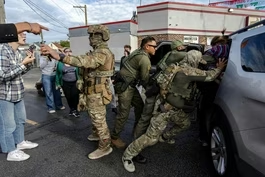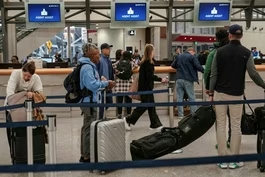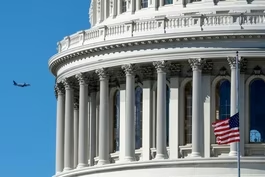
Nigeria rejects Trump's claim of targeted Christian violence
Clip: 11/6/2025 | 8m 19sVideo has Closed Captions
Amid rising violence, Nigeria rejects Trump's claim of targeted Christian persecution
This week, President Trump threatened to send the U.S. military into Nigeria for not doing enough to protect Christians. For years, Nigeria has struggled to curtail violence across the country, from international terrorist groups to disputes between farmers and herders. But now, its leadership must face threats from both its internal adversaries and the White House. Nick Schifrin reports.
Problems playing video? | Closed Captioning Feedback
Problems playing video? | Closed Captioning Feedback
Major corporate funding for the PBS News Hour is provided by BDO, BNSF, Consumer Cellular, American Cruise Lines, and Raymond James. Funding for the PBS NewsHour Weekend is provided by...

Nigeria rejects Trump's claim of targeted Christian violence
Clip: 11/6/2025 | 8m 19sVideo has Closed Captions
This week, President Trump threatened to send the U.S. military into Nigeria for not doing enough to protect Christians. For years, Nigeria has struggled to curtail violence across the country, from international terrorist groups to disputes between farmers and herders. But now, its leadership must face threats from both its internal adversaries and the White House. Nick Schifrin reports.
Problems playing video? | Closed Captioning Feedback
How to Watch PBS News Hour
PBS News Hour is available to stream on pbs.org and the free PBS App, available on iPhone, Apple TV, Android TV, Android smartphones, Amazon Fire TV, Amazon Fire Tablet, Roku, Samsung Smart TV, and Vizio.
Providing Support for PBS.org
Learn Moreabout PBS online sponsorshipAMNA NAWAZ: This week, President Trump threatened to send the U.S.
military into Nigeria and to cut off American aid for not doing enough to protect Nigerian Christians.
Nigeria and its 236 million people comprise the most populous nation in Africa, roughly split between Christians and Muslims.
For years, it's struggled to curtail violence across the country, from international terrorist groups to disputes between farmers and herders.
But now, as Nick Schifrin reports, its leadership must face threats from both its internal adversaries and from the White House.
NICK SCHIFRIN: In Nigeria's northeast, the carcass of a truck is still smoking, an office building's facade is burned black, and an army pickup charred beyond recognition, all targets of Islamic State West Africa Province, which two weeks ago filmed as it torched a military barracks and launched simultaneous attacks across four districts.
For years, Islamist terrorists have plagued northern Nigeria.
Best known as Boko Haram, they haven't only targeted the military.
Boko Haram violently opposes female education, and, in 2014, kidnapped 276 schoolgirls; 82 remain in captivity.
Its bombed mosques, blowing up this place of prayer in 2014, killing 120.
Boko Haram has also targeted Christians, as I saw in 2015 in the Eastern city of Mubi.
Outside the nearby Church of the Brethren, the damage is everywhere.
Inside, high above the podium, the fire set by Boko Haram almost erased the cross from the wall; 16 parishioners died.
Elia Usman is the church's secretary.
ELIA USMAN, Church of the Brethren: When these people landed in Mubi, they will ask you, are you a Christian or a Muslim?
When you say you're a Christian, they will shoot you.
There's no one single church left in Mubi.
They're burned it.
NICK SCHIFRIN: They still do.
In 2022, the Nigerian government says members of Al-Shabaab, usually based in Somalia, attacked this church in Southwest Nigeria.
The floor was still stained from 50 parishioners slaughtered as they attended Sunday mass.
Nigeria says it's reduced terrorism, although it's identified a new group with international links in the northwest called Lakurawa.
Most Nigerian Muslims live in the north, most Christians live in the south, and in the middle, the two groups overlap, as do tribes, farmers and herders, who can clash violently.
For decades, nomadic herders, almost all of whom are Muslim, have fought farmers, most of whom are Christian, over land disputes and scarce resources.
The independent conflict monitor ACLED tells "PBS News Hour" last year's data show a rise in Christian fatalities, mostly in Central Nigeria, and, this year, there's been a 43 percent increase in attacks by Fulani herders over last year.
But the vast majority of the incidents were over land disputes, not targeting because of religion.
This June, at least 150 displaced people staying at a Catholic mission were killed.
The community blamed Muslim Fulani herders.
Attacks like this one have led to the White House.
QUESTION: Do you envisage U.S.
boots on the ground?
DONALD TRUMP, President of the United States: Could be.
I mean, a lot of things -- I envisage a lot of things.
They're killing record numbers of Christians in Nigeria.
NICK SCHIFRIN: Last month, President Trump designated Nigeria a country of particular concern under the International Religious Freedom Act and last weekend wrote he may very well go into that now-disgraced country guns a blazing.
NINA SHEA, Center for Religious Freedom Director, Hudson Institute: The government doesn't help the Christians.
They're not protecting them.
They're not protecting their villages.
NICK SCHIFRIN: Nina Shea directs the Hudson Institute's Center of Religious Freedom.
She and 30 other advocates, Christian organizations and think tanks wrote a letter in October to President Trump saying the Nigerian government demonstrably tolerates relentless aggression uniquely against Christian farming families.
Why do you think that a lot of this violence is purely directed at Christians, when there's also Muslim-on-Muslim violence, Christian-on-Christian violence, and the government itself has failed to stop all the violence regardless of the victim?
NINA SHEA: Well, the government tries to stop the violence.
It is fighting military warfare against Boko Haram and Islamic State up in the north and other, many -- a number of other groups as well.
It is not trying to arrest or prosecute or in any way rein in these Fulani herders.
Local Christian leaders are telling us that they are trying to cleanse the land of Christians, that they are establishing the land for Islamic rule.
NICK SCHIFRIN: Nigeria's government insists it's taking steps to stop violence that targets all Nigerians.
DANIEL BWALA, Special Adviser to Nigerian President: As a responsible government, we refuse to approach the fight against terrorism from a profiling point of view.
That's why we discourage the idea that it is a target -- targeted Christian -- it's a hoax.
It's a hoax.
NICK SCHIFRIN: Daniel Bwala is a special adviser on the media to Bola Tinubu, who became Nigeria's president in 2023.
Bwala grew up in Borno state, the epicenter of Boko Haram violence.
DANIEL BWALA: We lived through these experiences where we have a lot of our loved ones having been killed by Boko Haram when it started.
The killings by the terrorists or the insurgents or the Boko Haram, it is not targeted at any particular religion.
NICK SCHIFRIN: But, in Central Nigeria, as you know, there are international organizations who are tracking more violence between herders, almost all of whom are Muslim, against farmers, most of whom are Christian.
Why hasn't the government been able to reduce that violence?
DANIEL BWALA: It is a case of cattle rustling and then the case of incursion on people's land and land grabbing by the Islamic militia, so to speak.
We have been dialoguing with the people, and we have been sifting out and isolating criminal elements who are taking advantage of that situation to cause mayhem to our people.
NICK SCHIFRIN: But do you acknowledge that there are many Nigerians, Christians and Muslims who feel that the government hasn't done enough to guarantee their security?
DANIEL BWALA: Yes, I will not deny the fact that there have been many.
And we have been saying that we have limitation of arms and ammunition.
Our relationship with America will help strengthen this fight.
NICK SCHIFRIN: Historically, the U.S.
and Nigerian militaries have trained together and shared intelligence to target terrorist groups.
But in a country that is generally pro-American, President Trump's threats caused widespread criticism.
The government offers collaboration.
DANIEL BWALA: When President Trump said what he said, we take it -- we took it in good faith.
We feel like it's a message that calls for a sitting down, so we can broaden this conversation around what we need.
Donald Trump, quite frankly, is one president that African people celebrate the most, because he's not political correct about any opinion he holds.
We don't need interpreter to tell us that Donald Trump thinks well about Nigeria.
That's why we don't take what he says hook-like and sinker.
He has done that to almost everybody.
He even threatened to turn Canada to a state.
He dragged the South African president to the White House.
DONALD TRUMP: Death, death, death.
DANIEL BWALA: He did that to Zelenskyy.
DONALD TRUMP: And what you're doing is very disrespectful to the country.
DANIEL BWALA: We look at the psychology, and we work around that.
And what we're trying to do is to pass the message through the base, his consumer base, to understand that hoax is not a reflection of what the Nigerian people are.
NICK SCHIFRIN: But the violence is real, and they have led to real threats of American intervention against a historic African partner.
For the "PBS News Hour," I'm Nick Schifrin.
After Kirk’s death, young conservatives carry on his message
Video has Closed Captions
Clip: 11/6/2025 | 8m 18s | After Charlie Kirk’s assassination, young conservatives work to carry on his message (8m 18s)
After Kirk’s death, young conservatives carry on his message
Video has Closed Captions
Clip: 11/6/2025 | 8m 18s | After Charlie Kirk’s assassination, young conservatives work to carry on his message (8m 18s)
'A House of Dynamite' sparks nuclear threat discussion
Video has Closed Captions
Clip: 11/6/2025 | 7m 55s | Netflix’s ‘A House of Dynamite’ sparks discussion about nuclear threats (7m 55s)
The impact of lowering the cost of weight loss drugs
Video has Closed Captions
Clip: 11/6/2025 | 7m 10s | The potential impact of lowering the cost of weight loss drugs (7m 10s)
Judge criticizes immigration crackdown tactics in Chicago
Video has Closed Captions
Clip: 11/6/2025 | 5m 27s | Federal judge sharply criticizes immigration crackdown tactics in Chicago (5m 27s)
Travelers brace for disruptions as FAA cuts air traffic
Video has Closed Captions
Clip: 11/6/2025 | 6m 17s | Travelers brace for major disruptions as FAA cuts air traffic amid shutdown (6m 17s)
Where negotiations to end the federal shutdown stand
Video has Closed Captions
Clip: 11/6/2025 | 2m 3s | Where negotiations to end the federal shutdown stand (2m 3s)
Providing Support for PBS.org
Learn Moreabout PBS online sponsorship
- News and Public Affairs

FRONTLINE is investigative journalism that questions, explains and changes our world.

- News and Public Affairs

Amanpour and Company features conversations with leaders and decision makers.












Support for PBS provided by:
Major corporate funding for the PBS News Hour is provided by BDO, BNSF, Consumer Cellular, American Cruise Lines, and Raymond James. Funding for the PBS NewsHour Weekend is provided by...

